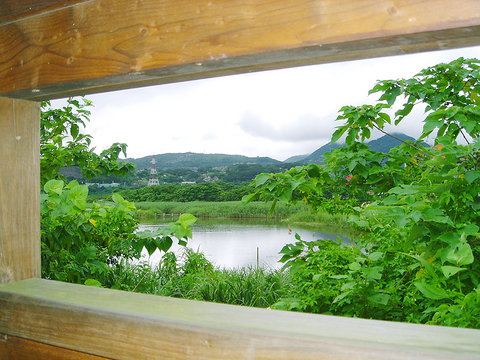Taipei has a vibrant cultural heart but little in the way of lungs, which is why the green expanse of Guandu Nature Park (關渡自然公園) is such a treasure.
An internationally recognized birding area, the park is home to over 830 species of animals, including 229 varieties of fowl.
Joining the flora and fauna this month are six installations from international artists, who have used natural materials to build their works and thereby focus attention on the environment.

PHOTO: JULES QUARTLY, TAIPEI TIMES
This is laudable, of course, and the 2006 Guandu International Outdoor Sculpture Festival, which opened a few weeks ago, provides a convenient hook for a day out to see one of the city's few natural hot spots.
If it's a weekend trip, try and beat the crowd by arriving at the Guandu Nature center in the morning. There's plenty to see in the exhibition and research halls, and the information will provide insight for what is to follow.
The 57-hectare nature park is in a low-lying part of the Taipei Basin, at the confluence of the Keelung and Danshui rivers. The mixture of salt and fresh water makes the area incredibly diverse from an ecological point of view. And this is what attracts the large variety of animals, plants and aquatic creatures.
Having come to terms with the dynamics of wetland eco-systems and learned to differentiate red mangrove from mango, it's time to move on and explore the outdoor observation area; take a trail through the park and check out twitchers in the bird-watching area.
The installations may be a tad disappointing if you're expecting a bold statement. For instance, US artist Jane Ingrame Allen's Nests for Humans are made from fallen branches and are similar to shelters that have been abandoned by picnickers elsewhere.
"These human-sized nests are for people to enter and rest there a while to think about man's relationship to nature and the wonder of a bird's creation," the artist says in a statement about her work.
Japan's Rikuo Ueda made a wind machine of paper and natural debris; while Yimuko Yamazaki floated a raft of soil onto a pond to find out what grows on it.
Having contemplated nature in the abstract it's time to get on your bike and tour the riverside bike trails. A shop nearby on Zhixing Road rents bicycles at around NT$50 per hour.
Take a deep breath and enjoy a trip to Guandu. It's easy to get to on the MRT and a pleasant change from the concrete jungle.
Guandu day out:
Where: Guandu Nature Park, 55, Guandu Rd, Beitou Dist, Taipei (台北市北投區關渡路55號).
Opening hours: March to October open 9am to 5pm on weekdays, 9am to 6pm on weekends. November to February, 9am to 5pm on weekdays, 9am to 5:30pm on weekends. The park is closed on Mondays.
Telephone: (02) 2858-7417.
On the Net: For a detailed map visit www.gd-park.org.tw/en/e1.htm
Pedal power: Chiang Hsian-chin (江憲欽) Bikes, 206 Zhixing Rd, Beitou District, Taipei (台北市北投區知行路206號). Call (02) 2858-7046.
On a prayer: Guandu Temple (關渡宮), 360, Zhixing Rd, Taipei (台北市北投區知行路360號). Call (02) 2858 1281.

June 23 to June 29 After capturing the walled city of Hsinchu on June 22, 1895, the Japanese hoped to quickly push south and seize control of Taiwan’s entire west coast — but their advance was stalled for more than a month. Not only did local Hakka fighters continue to cause them headaches, resistance forces even attempted to retake the city three times. “We had planned to occupy Anping (Tainan) and Takao (Kaohsiung) as soon as possible, but ever since we took Hsinchu, nearby bandits proclaiming to be ‘righteous people’ (義民) have been destroying train tracks and electrical cables, and gathering in villages

Swooping low over the banks of a Nile River tributary, an aid flight run by retired American military officers released a stream of food-stuffed sacks over a town emptied by fighting in South Sudan, a country wracked by conflict. Last week’s air drop was the latest in a controversial development — private contracting firms led by former US intelligence officers and military veterans delivering aid to some of the world’s deadliest conflict zones, in operations organized with governments that are combatants in the conflicts. The moves are roiling the global aid community, which warns of a more militarized, politicized and profit-seeking trend

The wide-screen spectacle of Formula One gets a gleaming, rip-roaring workout in Joseph Kosinski’s F1, a fine-tuned machine of a movie that, in its most riveting racing scenes, approaches a kind of high-speed splendor. Kosinski, who last endeavored to put moviegoers in the seat of a fighter jet in Top Gun: Maverick, has moved to the open cockpits of Formula One with much the same affection, if not outright need, for speed. A lot of the same team is back. Jerry Bruckheimer produces. Ehren Kruger, a co-writer on Maverick, takes sole credit here. Hans Zimmer, a co-composer previously, supplies the thumping

No more elephant and monkey acts. No more death-defying motorbike stunts. No more singing or acting on stage. Several hundred spectators still clapped constantly when acrobats with Dongchoon Circus Troupe, South Korea’s last and 100-year-old circus, twirled on a long suspended fabric, juggled clubs on a large, rotating wheel and rode a unicycle on a tightrope under the big top. “As I recall the hardship that I’ve gone through, I think I’ve done something significant,” Park Sae-hwan, the head of the circus, said in a recent interview. “But I also feel heavy responsibility because if Dongchoon stops, our country’s circus, one genre